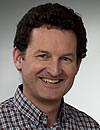Short CV
Giselher Grabenweger is entomologist at Agroscope, the Swiss centre of excellence for agricultural research. He is responsible for Biological Control and IPM in arable crops and grasslands. He has 20 years of experience in field experiments and project-related entomological research. His main interest is the diagnosis, monitoring and management of pest insects, especially their control by natural antagonists, e.g. hymenopteran parasitoids, entomoparasitic nematodes or entomopathogenic fungi.
He achieved his Master’s (1998) and PhD (2003) in Zoology/ Entomology at the University of Vienna, Austria, with research on biocontrol of invasive species. After three years as a research assistant at the University of Natural Resources and Applied Life Sciences in Vienna (2001-2004) and two years at the University of Applied Sciences in Berlin (2005-2006) he got a position as an agricultural entomologist at the Institute of Plant Health of the Austrian Agency for Health and Food Safety (AGES, 2007-2011). In 2012, he moved to Agroscope in Zurich, where he currently holds a position as a senior scientist in the research group “Extension Arable Crops”.
Giselher started his scientific career with research on the biological control of the horse chestnut leafminer, Cameraria ohridella, with hymenopteran parasitoids. Later on, he focused on the management of pest insects in arable crops, especially the control of western corn rootworm, Diabrotica virgifera virgifera, with entomoparasitic nematodes. Currently, his main area of research is the control of soil borne insect pests, like wireworms and grubs, with entomopathogenic fungi. He has collaborated with scientists from all over Europe in many projects, including the EU FP5 project “Controcam” and the EU FP7 project “Inbiosoil”, and he is currently coordinator of the H2020 project “IPM-Popillia”.
Giselher joined IOBC-WPRS in 2006 and since then participated in the meetings of the WGs “Pheromones and other semiochemicals in integrated production”, “Integrated control in oilseed crops”, and “Microbial and nematode control of invertebrate pests”, as well as in meetings of the “International working group on Ostrinia and other maize pests” of IOBC-Global. In January 2010, he joined the IOBC-WPRS council as a deputy member. He treasurer from 2018 to 2021, and is the president of the IOBC-WPRS since 2022.
Agroscope
Department “Plants and Plant Products”
Research Group “Extension Arable Crops”
Reckenholzstrasse 191
8046 Zurich, SWITZERLAND
Phone: +41-58 468 7597
E-mail: president@iobc-wprs.org
